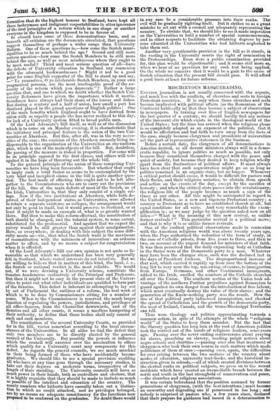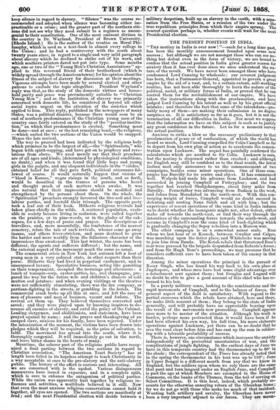MISCHIEVOUS MASQUERADING.
ENGLISH journalism is not usually concerned with the aspects,
and much less with the conflicts, of churches and sects in foreign Protestant countries. It is only when those churches and sects become implicated with political affairs (as the Romanism of the Continent habitually is) that they become a subject of observation in newspapers. In turning over files of English newspapers for the last quarter of a century, we should hardly find any notices of the incessant stir which exists in the theological world of the United States ; but the time has arrived when the religious phase is so completely adopted as an exponent of the political, that it would. be affectation and bad faith to turn away from the facts of the case, simply because clergymen and presidents of universities act the part of representative statesmen in the business. Before a certain date, the clergymen of all denominations in
America desired, as all devout ministers always will in a demo- cratic republic, to ignore politics as much as possible, not only because they considered themselves charged with the peace and quiet of society, but because they desired to keep religion wholly apart from the fluctuations of political affairs. It must always have been clear that such sequestration might go on as long as politics remained in an organic state, but no longer. Whenever a critical period should ensue, it would be difficult for pastors and their flocks, and their religious societies, to abstain from Bp:ft& and action on the events of the day, except by the sacrifice of honesty ; and when the critical state passes into the revolutionary, the religious life of the people becomes as much a sign of the times as any other. All this might be anticipated in regard to the United States, as a new and vigorous Protestant country ; a country so Protestant as to have no established church at all, but equal conditions for all sects. And very remarkable the exem- plification is ; as we may judge by the question asked now on all sides—" What is the meaning of this new revival, so unlike former revivals ?" This particular revival is a political move ; and that is why it is so unlike former revivals.
One of the earliest political observations made in connexion
with the American religious world was above twenty years ago, when the Pope authorized the reduction of the term of study, in the case of Catholic priests, from five years to three, and then to two, on account of the urgent demand for ministers of that faith. It was then perceived that the daily expanding body of Catholics in the States were of the Democratic party to a man. Whatever may have been the changes since, such was the declared fact in the days of President Jackson. The disproportioned increase of that seat, which carried it rapidly up from near the bottom of the long list to very near the top, was owing, of course, to immigration from Europe. Germans, and other Continental immigrants, added to the Irish, swelled the numbers of the Catholic churches all over the Union. The southern section of the Union took ad- vantage of the northern Puritan prejudices against Romanism to guard against its own danger from the introduction of free labour, which must eventually destroy the value of their slaves ; and the generation of the Know-nothing party was the result. How the rise of that political party influenced immigration, and checked the spread of Catholicism and the growth of the democratic party, the west of Ireland, Canada, and the trans-Mississippi Territories can tell.
Thus were theology and politics approximating towards a common action, in spite of the attempts of the whole " religious world" of the States to keep them asunder. But the fact that the Slavery question has long lain at the root of American polities took the control out of the hands of religious leaders some years ago. Passing over the never ending controversies about praying for slaves, preaching on slavery, reading pulpit notices about negro schools and charities ;—passing over also that treatment of clergymen who took their own course in such matters which made politicians of them at owe ;—passing over, again, the difficulties for ever arising between the two sections of the country about modes of education, university text-books, and the historical in- struction given in schools,—all of which created divisions between the clerical ranks on political subjects, we press on to the recent incidents which have created an irremediable breach between the north and south in the last stronghold of conservatism and peace, —the churches and religious associations. It was certain beforehand that the position assumed by former generations of clergymen, (with the best intentions,) must become an unworthy and degrading one if persevered in too long ; and nobody is surprised at pastors who, a few years since, declared that their prayers for guidance had issued in a determination to
keep silence in regard to slavery. "Silence" was the course re- commended and adopted when silence was becoming either im- practicable or a crime • and the greater part of the northern citi- zens did not see why they need submit to a regimen so uncon- genial to their constitution. One of the most eminent divines in the country is Dr. Wayland, President of Brown University, (Rhode Island.) He is the author of the treatise on Moral Phi- losophy, which is used as a text-book in almost every college in the Union ; and he had a controversy with the south about twenty years since, in regard to a single and very mild paragraph about slavery which he declined to strike out of his work, and which southern printers dared not put into type. Some months
Prone or two of the " Young Men's Christian Associations " ap- ed to this reverend friend of their brotherhood (which is widely spread through the Americantowns) for his opinion about the fitness of the subject of slavery for discussion at their meetings. Vigorous attempts have been made by several clerical and other patrons to exclude the topic altogether. President Wayland's reply was that, as the study of the domestic virtues and house- hold purity and peace was preeminently suitable to " Christian Young Men " • and as the institution of slavery was primarily concerned with domestic life, he considered it beyond all other social topics urgent on the attention of the societies which applied to him. This reply, published in the newspapers of many States, was a political disaster, because there would soon be an end of southern predominance if the Christian young men of the country once fairly entered on the study of the " peculiar institu- tion," on which that predominance is erected. Something must be done—and at once ; or the last remaining bond,—the religious, —which united the two sections of the Union would be snapped. Hence the late revival.
The way to proceed had been indicated by the religious body which promises to be the largest of all,—the Spiritualists," who began with spirit-rapping, and have got on to prophecy and reve- lations from above. We need merely say that their preachers are of all ages and kinds, (determined by physiological conditions, no doubt,) and when it was found that little boys and young girls in the pulpits, and any eloquent individuals in the " circles," obtained belief for all they gave forth, political utterances fol- lowed of course. It would naturally happen that visions of "blood in Kansas," negro risings in the south, and so forth, would be described in the trances of persons who heard and thought much of such matters when awake. It was also natural that their impressions should be modified and strengthened by the persons about them. On the whole, the " Spiritualist " preachers strongly favoured the free-soil and free- labour parties, and foretold their triumph. The opposite party took a leaf out of their book. Hitherto religious revivals had taken place chiefly in the wilds. A scattered population, excit- able in society because living in seclusion, were called together on the prairies, or in pine-woods, or in the glades of the oak- copses, for a few days of praise and prayer. The descriptions of travellers, and, more mournfully, the tombstones of the nearest cemetery, relate the tale of such revivals, whence some go away insane, and others fever-stricken, and more destined to grow the harder and more worldly from the fallacious character of the impressions thus awakened. This last winter, the scene has been different, the agents and sufferers different ; but the name, and the external aspect of the movement much the same as usual.
The commercial crisis in New York last autumn left a host of young men in a very reduced state, in other respects than their purse. Hitherto they had lived in perpetual excitement, and in unsurpassed luxury. Speculative business, acting like gambling on their temperament, occupied the mornings and afternoons : a lunch of terrapin-soup, oyster-patties, ice, and champagne, pre- pared the way for the future wife and children's dinners of cold mutton and tatoes : and when evening visitings or the theatres were not s ciently stimulating, there was the lire company, or partisan-fighting in the streets, or gambling in the hotels. The commercial crash broke up all this at once, and left the race of men of pleasure and men of business, vacant and forlorn. The revival set them up. They believed themselves converted and saved ; and they were played upon by knowing inspirers to de- nounce all enemies of slavery, and extol the policy of the Cabinet. Leading clergymen, and abolitionists, and statesmen, have been prayed against by name ; and the prayer and thanksgiving of an escaped slave, anxious for his family, have been rejected. Under the intoxication of the moment, the victims have been drawn into 1p edges which they will be required,. as the price of salvation, to fulfil. The movement has spread into the south, where it is thoroughly congenial. It will immediately go out in the north, and leave bitter shame in the hearts of many. Meantime, the soberer part of the religious public have recog- nized a final parting between the two sections in regard to Christian association. " The American Tract Society " has at length been foiled in its hopeless attempt to teach Christianity in a way acceptable at once to the pro-slavery and the anti-slavery public. The history of the effort is curious and interesting. All we are concerned with is the upshot. Various disingenuous manoeuvres have issued in exposure, and in a complete split, which is sure to enhance the antagonism of political parties. While the union was apparently knit together by religious in- fluences and activities, a multitude believed in it still. Now that even the most anxious religious conservatism cannot hold it together, all eyes are opened. The two sections are manifestly at fend ; and the next Presidential election will decide between a military despotism, built up on slavery in the south, with a sepa- ration from the Free States, or a reunion of the two under the true republican principles from which their empirespranak.. The nearest question perhaps is, whether events will wait for e nest Presidential election.



































 Previous page
Previous page